





The University of Louisville Brandeis School of Law is a leader in the study of environmental justice. Environmental justice (EJ) is about the fair treatment of all peoples, regardless of race, ethnicity, or income, in environmental laws, policies, and conditions. There are many dimensions of EJ:
+ Unequal exposure of low-income people and people of color to air and water pollution and to toxic chemicals;
+ Poor and unequal enforcement of environmental laws
+ Industrial facilities, toxic and solid waste sites, and contaminated lands (brownfields) in or near low-income communities of color
+ Both formal and practical barriers to the participation and influence of lowincome people of color in environmental decision making and governance
+ Inequitably less and worst environmental benefits for low-income communities of color, such as parks, trees, and restored streams
+ Related inequities in fields such as land use, energy, water, natural resources, food, climate, and health
+ Community organizing, activism, and advocacy
+ The systemic causes and outcomes of environmental injustice and need for systemic change
Environmental injustice is one of the most pressing problems in Kentucky and the Louisville metropolitan area, especially West, South, and Southwest Louisville neighborhoods. EJ isn’t just an academic topic; it’s an important area for study and action in partnership with affected community residents, neighborhood organizations, environmental groups, government agencies, and businesses.
The University of Louisville Brandeis School of Law’s commitment to EJ is an essential part of the Law School’s commitments to social justice, public service, and high-impact research. It’s part of the Law School’s emphasis on mentorship of students and highcaliber innovative learning, including through experiential, community-based, and field-study opportunities. Our EJ work is at the intersection of five University initiatives: anti-racism, community-engagement, communityempowerment, sustainability, and health-equity.
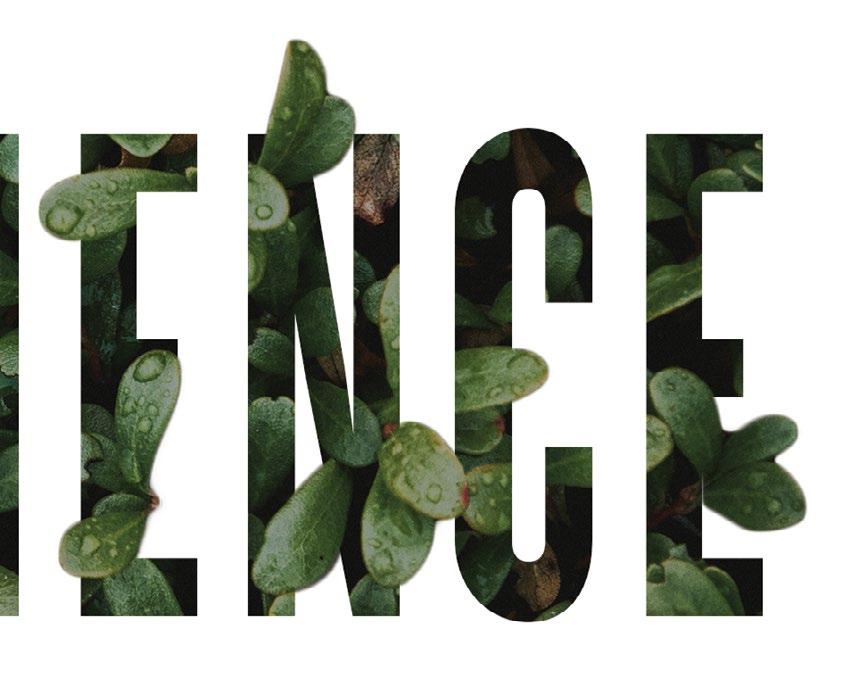


The Resilience Justice Project, directed by Professor Tony Arnold, Boehl Chair in Property and Land Use, is the nation’s leading center for the study and application of resilience justice in marginalized communities, especially low-income neighborhoods of color. The Law School provides 3 to 5 Resilience Justice Fellowships per year to fund students to work in the Resilience Justice Project.
The concept of resilience justice builds on environmental justice and climate justice frameworks. However, it goes further, addressing the relationships between environmental conditions, systemic inequalities, and other factors, such as poverty, racism, land use patterns, and housing insecurity. Low-income Black, Latino/a, Asian, and Native American communities have greater vulnerabilities and lesser resilience because of these cross-system dynamics. The Resilience Justice Project is especially concerned about green and blue infrastructure (e.g., parks, trees, restored streams), green gentrification and displacement, inclusive governance systems, and neighborhood power.
In the Resilience Justice Project, teams of faculty and students conduct resilience justice assessments of marginalized neighborhoods, in partnership with community groups and government agencies. They identify policy and systemic reforms to increase the resilience and empowerment of low-income communities of color. These assessments have been done in: Los Angeles, Fresno, and Sacramento, CA; Washington, DC; and several neighborhoods in West, South, and Southwest Louisville, KY.
The Resilience Justice Project also produces new knowledge about community resilience, governance, and environmental justice. Its most recent article is “Resilience Justice and Urban Water Planning,” published in the Seton Hall Law Review as part of a symposium issue on social justice and cities:
scholarship.shu.edu/shlr/
For more information about the Resilience Justice Project, please see:
louisville.edu/law/resiliencejustice
In late 2020 Councilwoman Keisha Dorsey of Louisville Metro District 3 approached a group of technical and legal writing scholars to ask: how might information about air pollution and the industries that contribute to this issue be made more accessible to public audiences? In early 2021, the Environmental Health Literacy Coalition (EHLC) formed to answer such a question. Coalition partners include Professor Shavonnie Carthens (UofL Brandeis School of Law), Dr. Megan Poole (UofL Department of English), Dr. Abigail Koenig (UofL College of Business), Louisville Metro Councilwoman Dorsey, and local community partners, Rubbertown Emergency Action (REACT) and the Kristy Love Foundation.
The EHLC’s first project is entitled, “Air Justice,” and the project’s initial aim is to create a website that makes the science of air pollution easier to understand and that shares stories
related to air pollution around Rubbertown in West Louisville. As an interdisciplinary team of researchers and community activists, the coalition approaches this project from a diverse range of perspectives to analyze environmental justice concerns around air pollution.
EHLC researchers have engaged in an UofL Institutional Review Boardapproved study entitled, “Getting the Listening” in Louisville: Public Health Literacy and Environmental Justice in and around Rubbertown. The primary objectives of this study are two-fold:
1) to determine baseline interest level in and understanding of the science of air pollution in District 3
2) to test whether a central District 3 resource website boosts constituents’ engagement with the issue
Further, the coalition is fielding questions posed by community partners that speak to the legalities of environmental justice and the disproportionate impact on communities of color, particularly the Black community in West Louisville.
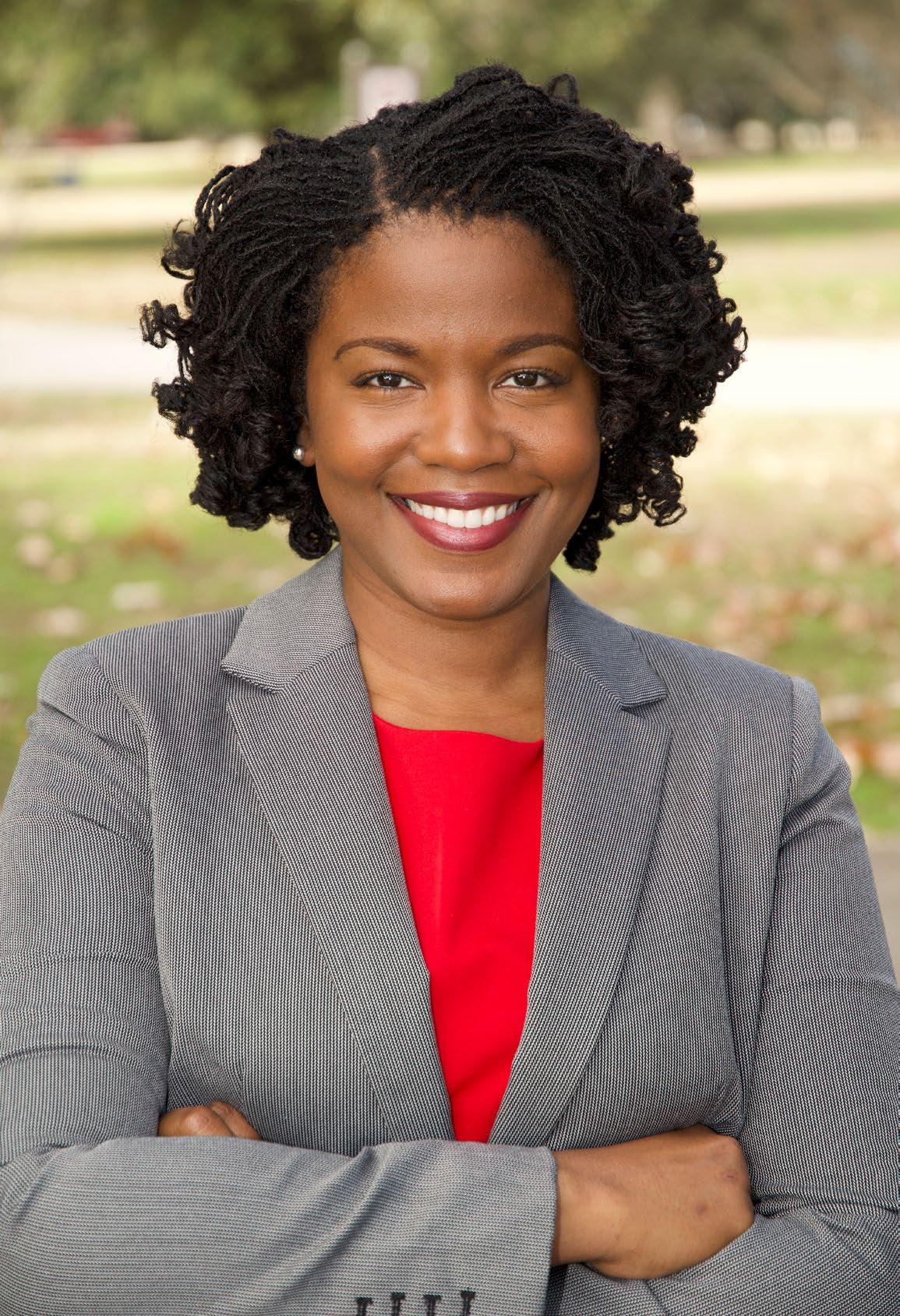
Community partners have asked questions concerning: the meaning of environmental regulations impacting West Louisville, comparisons among other jurisdictions that locally regulate air pollution, alternative legal models for air pollution regulation, and the existence of legal precedent challenging local air pollution regulatory bodies. Professor Carthens is heavily involved with researching these legal questions. She is assisted by Gabriella Wirasakti, a 3L at the Brandeis School of Law, and the coalition’s legal intern. Gabriella is just one of several UofL students working on the Air Justice project.
The Environmental Health Literacy Coalition has received great support from the Louisville community and UofL Much of the work on the Air Justice project thus far has been funded by a generous $250,000 grant through the Humana Foundation’s Community Partners Program. In addition, the EHLC was recently awarded a grant, for almost $100,000, from the UofL Health Equity Innovation Hub to assess their study’s initial findings and research policy-based community questions.
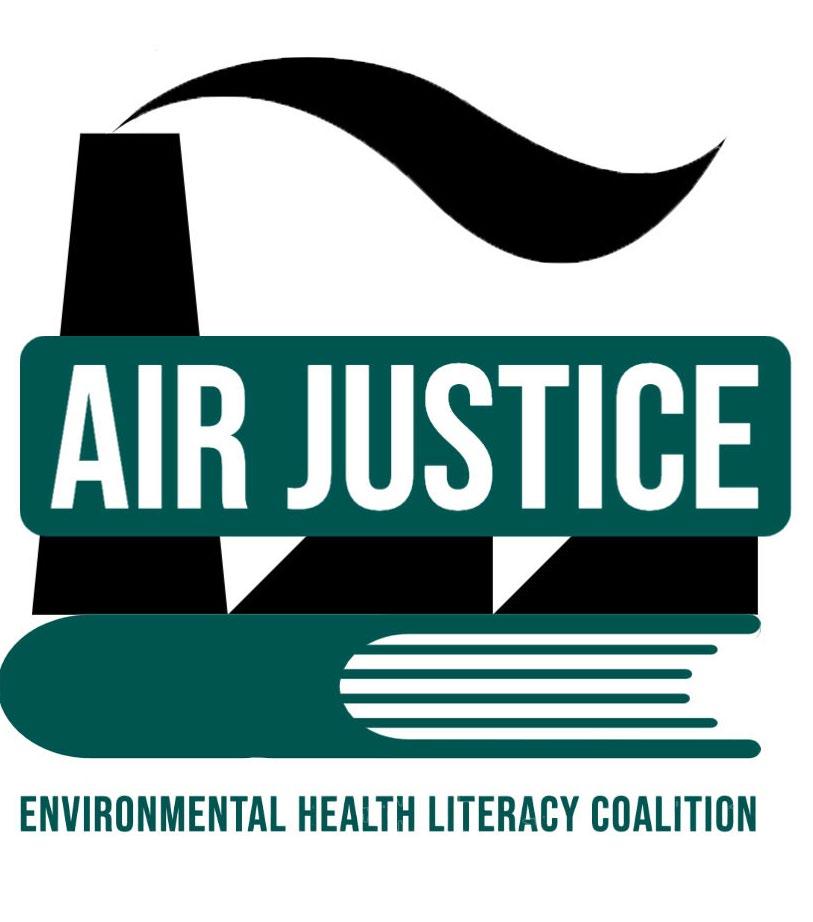
Professor Tony Arnold and the Resilience Justice Project have received a U.S. Environmental Protection Agency Clean Water Act Section 319(h) grant to integrate environmental justice, resilience justice, and inclusive community engagement into watershed planning for the Mill Creek watershed in southwestern Louisville. The team, including Resilience Justice Fellows and Professor Arnold’s Fall 2022 interdisciplinary Water Resources class, will conduct policy analyses and in-depth semi-structured interviews with community residents, especially reaching out to and including residents of marginalized neighborhoods.
The team will work with partners that include the Louisville/Jefferson County Metropolitan Sewer District, the Louisville Metro Parks Department, the Kentucky Division of Water (Kentucky Energy & Environment Cabinet), The Nature Conservancy, the Kentucky Waterways Alliance, and the Kentucky African-American Heritage Museum.
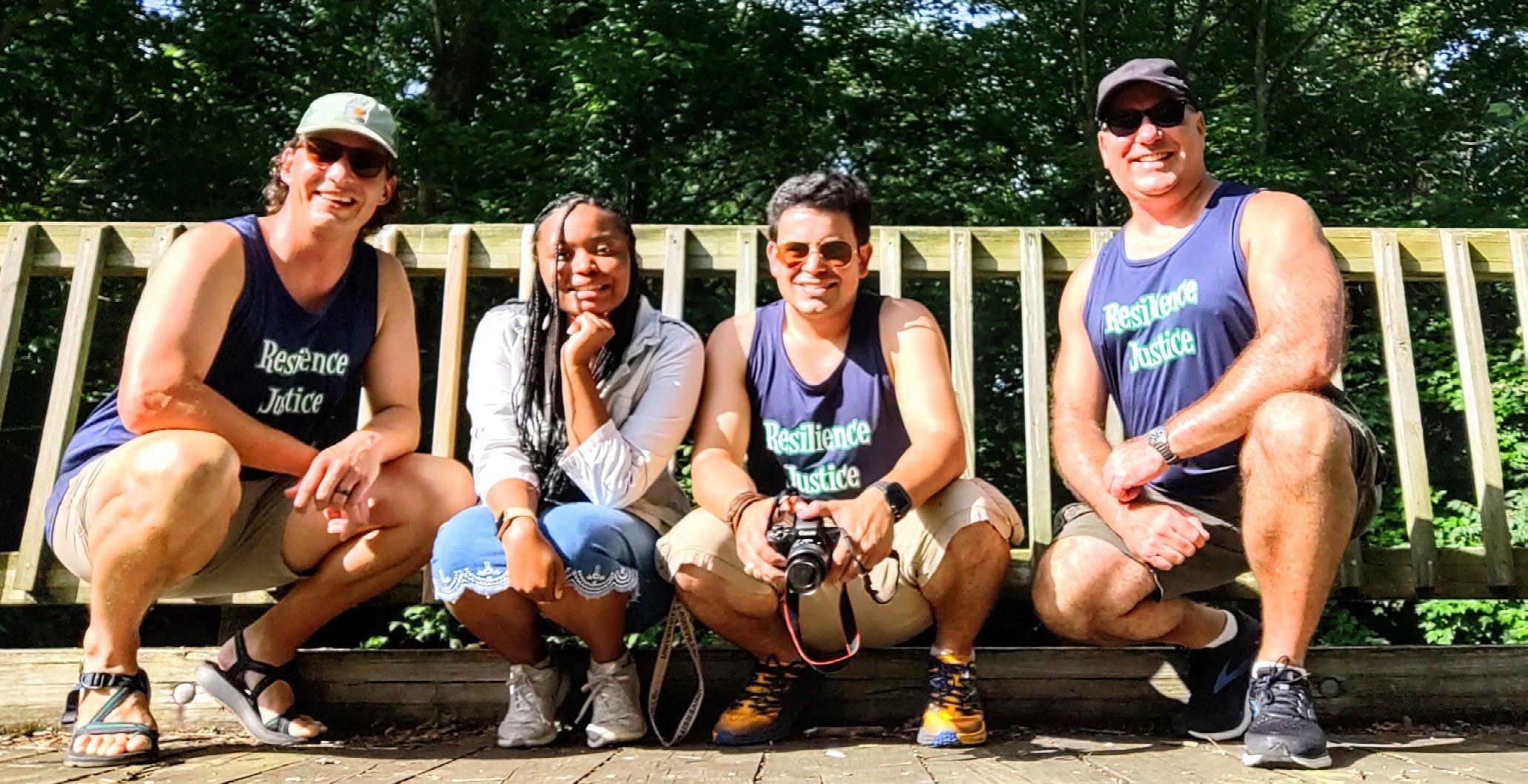
Professor Tony Arnold has been engaged in environmental justice since the 1980s and has published several foundational works on the relationship between environmental justice and land use, including a 1998 article “Planning Milagros: Environmental Justice and Land Use Regulation,” and the book Fair and Healthy Land Use: Environmental Justice and Planning (American Planning Association 2007). In these works, he presents empirical research on industrial zoning disparities in low-income neighborhoods of color, explores land use regulatory tools that could be used to advance environmental justice, and develops environmentaljustice principles of land use planning. These publications have been:
+ Used extensively by environmentaljustice activists in low-income communities of color from California to Chicago
+ Used by local governments throughout the U.S. and world, and recommended by both the U.S.
Environmental Protection Agency (US EPA) and the American Planning Association as key resources
+ Selected by African American graduate students as core reading for the first-ever course in race and urban design at the Harvard Graduate School of Design
+ Widely cited and quoted by scholars in many disciplines worldwide
+ Cited by the Supreme Court of Pakistan in a landmark climate-justice judicial opinion in 2021
Professor Shavonnie Carthens, and Environmental Health Literary Coalition partners, have secured placement for their article, “Getting the Listening” in Louisville: Public Health Literacy and Environmental Justice in and around Rubbertown,” in the Journal of Health and Rhetoric. In this article researchers argue that a “…health coalition must look to legal rhetoric as inherent to public health rhetoric, or recognize that the dissemination of information about public health is a justice-based act…” Further, the article acknowledges that environmental justice is racial justice, given that communities of color are overwhelmingly impacted by air pollution in West Louisville.
An article by Professor Tony Arnold and 33 current or former students (Resilience Justice Project researchers) was selected as one of the top 20 environmental law articles published in the U.S. in 2021 out of hundreds of law-journal articles nationwide by the Environmental Law and Policy Annual Review (ELPAR), Environmental Law Institute, and Vanderbilt University School of Law. The article, “Resilience Justice and
Community-Based Green and Blue Infrastructure” was published in the in the William & Mary Environmental Law & Policy Review and can be downloaded for free from the Social Science Research Network (SSRN). Professor Arnold also won a University-wide research award for the impact of his environmental justice and resilience justice research.
Professor Tony Arnold and the Resilience Justice Project are environmental justice advisors to the Community Engagement Core of the University of Louisville’s Center for Integrative Environmental Health Sciences (CIEHS). In this role, they create publicly accessible blogs about the relationships between EJ
and health equity and disseminate information at public events, helping to connect marginalized communities and scientists with one another.
CIEHS is funded by the National Institutes of Health.

Professors Tony Arnold, Cedric Merlin Powell, Laura Rothstein, and Catherine Fosl have edited a major book, Racial Justice in American Land Use, forthcoming from Cambridge University Press. The interdisciplinary book assesses the past and future of racial justice and injustice in American land use through legal doctrine, public policy and urban planning, and the history of social movements. It arose out of a Fall 2017 symposium
at the Brandeis School of Law to observe the centennial of the Buchanan v. Warley case, in which the U.S. Supreme Court struck down Louisville’s racial zoning ordinance in 1917. Several chapters of the book address the EJ aspects of land-use injustices.
Dr. Tiago de Melo Cartaxo and Professor Tony Arnold have published a chapter “Resilience Justice and Adaptive Law in European Cities,” in a book, Urban Climate Resilience: The Role of Law, edited by Drs. Angela van der Berg and Jonathan Verschuuren, and published by Edward Elgar Press. Cartaxo and Arnold presented their chapter at a workshop sponsored by the United Nations, Tilburg University, The IUCN Academy of Environmental Law, and the University of the Western Cape. Dr. Cartaxo was in residence at the University of Louisville Brandeis School of Law in 2018-2019 under a Fulbright Fellowship, working with Professor Arnold, who co-supervised Dr. Cartaxo’s PhD dissertation on resilience justice and adaptive law at Nova University of Lisbon, Portugal. Dr. Cartaxo is now a Senior Lecturer in Law at the University of Exeter, Law School Cornwall, where he is a co-founder of the Exeter Centre for Environmental Law, of which Professor Arnold is an external affiliate.

All 1L students learn about environmental justice in their Property I and II and/or Torts I and II classes. In Fall 2022, all 1Ls will participate in a major EJ field-trip to see the impacts of environmental injustices in local low-income neighborhoods of color. In addition, environmental justice is a major theme in 8 upper-level electives, each of which addressed different dimensions of EJ: Environmental Law; Land Use & Planning Law; Urban
Justice & Policy; Water Resources Law & Policy; Land & Ecosystem Conservation; Poverty, Health, & the Law; Environmental Practice; and Energy Law. In each of these 8 courses, students address actual EJ problems in communities through experiential learning that develops the students’ professional skills of advocacy, problem-solving, cultural competence, and legal and policy reform.
One of the strengths of EJ work at the Brandeis School of Law is its highly interdisciplinary nature. Faculty and students participate in interdisciplinary research and community-engagement teams and use methods, theories, and data from many disciplines. Several upperlevel classes have an interdisciplinary
focus and are cross-listed in Planning, Sustainability, and Urban & Public Affairs, which means that law students are learning with and from students in a wide range of disciplines.

The Journal of Animal and Environmental Law (JAEL) is a student-run, peer reviewed legal academic journal based at the University of Louisville Louis D. Brandeis School of Law and published in an exclusively electronic format. In recent years, published articles have addressed the environmental justice implications of surface mining on Appalachian communities, Yellowstone bison management plans on Native American hunting rights, and federal disaster relief on socioeconomic disparities
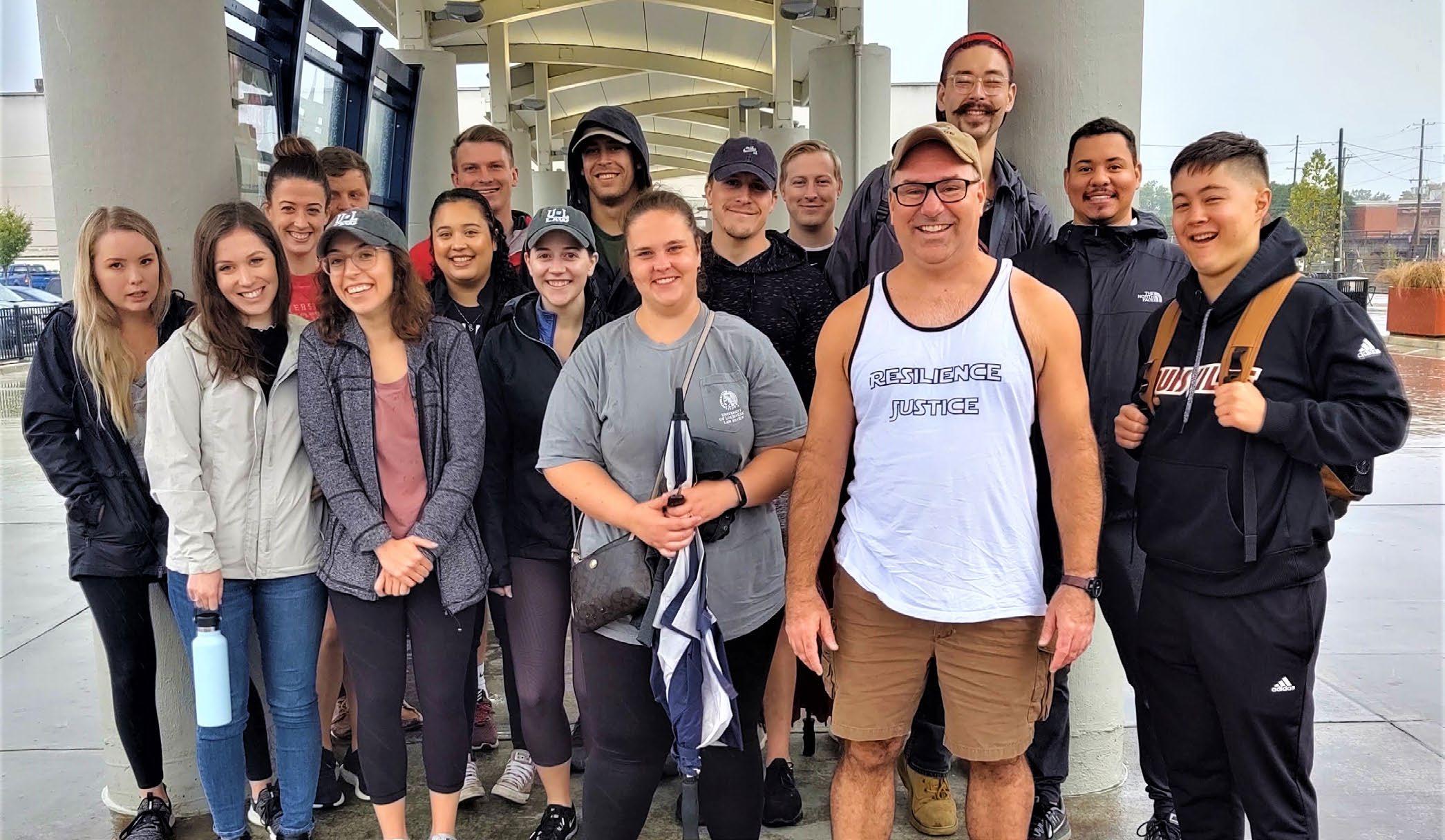

The Law School connects students of color to job opportunities and career development in environmental law, a field in which lawyers of color are extremely under-represented. For example, in Summer 2021, law student Cameron Lyons obtained a fellowship to work with the National Wildlife Federation nationally on public lands issues, and Lauren Neal was community engagement intern for Kentucky Waterways Alliance and a legal intern for the Kentucky Equal Justice Center, also funded by a fellowship. In Summer 2022, Trinity Brown and Frank Bencomo-Suarez worked on the U.S. EPA-funded Mill Creek watershed planning project as Resilience Justice Fellows. Faculty mentorship has been a key factor in connecting students of color to environmental law opportunities.
For more information, see UofL Brandeis School of Law strives to enhance the diverse make-up of legal experts in an underrepresented niche



Graduates of the University of Louisville Brandeis School of Law are leaders in environmental justice work, such as:
+ Andrew Black, JD/MDiv ’08, is the Public Lands Field Director for the National Wildlife Federation and works with Native Americans, Hispanics, and military veterans to protect the lands that are sacred or essential to them.
+ Cinnamon Butler, JD ’07, is Division Director with the Office of the Assistant Secretary for Civil Rights for the U.S. Department of Agriculture, where she assesses the racial impacts of federal farm programs and policies.
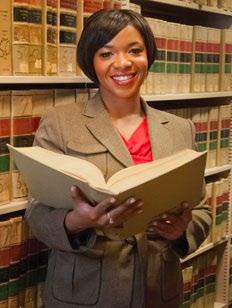
+ Liz Mosler, JD ’07, is Staff Attorney with the Kentucky Resources Council and an advocate on behalf of lowincome communities with respect to energy policies and environmental laws.
+ Randy Strobo, JD ’08, and Clay Barkley, JD ’09, both of Louisville’s Strobo & Barkley law firm, represent community residents, workers, and consumers who have been harmed by environmental pollution or land use decisions.
+ Charles Booker JD ’10, sought environmental-justice legislation and funding for West Louisville neighborhoods as a State Senator in the Kentucky Legislature, and is advocating for environmental justice as a candidate for the U.S. Senate.
+ Ryan Fenwick, JD/MUP ’14, is an attorney at the Law Office of Ryan Fenwick, Louisville, KY, representing working class people, nonprofits, and cooperatives on a variety of issues, including local land use and environmental matters.
+ Demitri Johnson-Cantu, JD ’21, has recently earned an LL.M. in Environmental and Energy Law from Georgetown University School of Law, where he concentrated his studies on environmental justice issues in energy laws and policies.
Boehl Chair in Property and Land Use

Professor of Law
Affiliated Professor of Urban and Public Affairs
Director of the Resilience Justice Project
tony.arnold@louisville.edu
Assistant Professor of Law
shavonnie.carthens@louisville.edu
The University of Louisville is an equal opportunity institution and does not discriminate against persons on the basis of race, age, religion, sex, disability, color, sexual orientation, national origin or veteran status.
Professor Craig Anthony (Tony) Arnold Professor Shavonnie Carthens